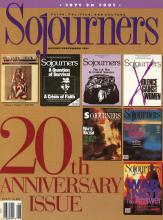The spirituality of the two most recent superpowers is examined separately in Garry Wills' Under God: Religion and American Politics (Simon and Schuster, 1990, $24.95, cloth) and Religion in the New Russia: The Impact of Perestroika on the Varieties of Religious Life in the Soviet Union (Crossroad, 1990, $17.95, cloth) by Jim Forest. According to these respected authors, the people of both countries are deeply religious, though they do the darndest things.
Jim Forest, former general secretary of the International Fellowship of Reconciliation and author previously of Pilgrim to the Russian Church (Crossroad, 1988), has had ample opportunity to trace his way through much of the Soviet Union, both before and after the reforms implemented by Mikhail Gorbachev. The story he recounts concerns a faith unleashed, a spirit set free.
In his preface Forest suggests that a third word should be added to an American's Russian lexicon (the first two being perestroika and glasnost): dukhovnost -- "quality of Spirit," or the private, social, and ethical dimensions of the relationship between a person and God. In the remainder of the book, Forest demonstrates just how that quality of Spirit is played out in the lives of the Soviet people, and how the dormant form is given freedom. Forest's warm prose gives life to the centrality of ritual in the myriad forms of Soviet religious experience.
Read the Full Article
